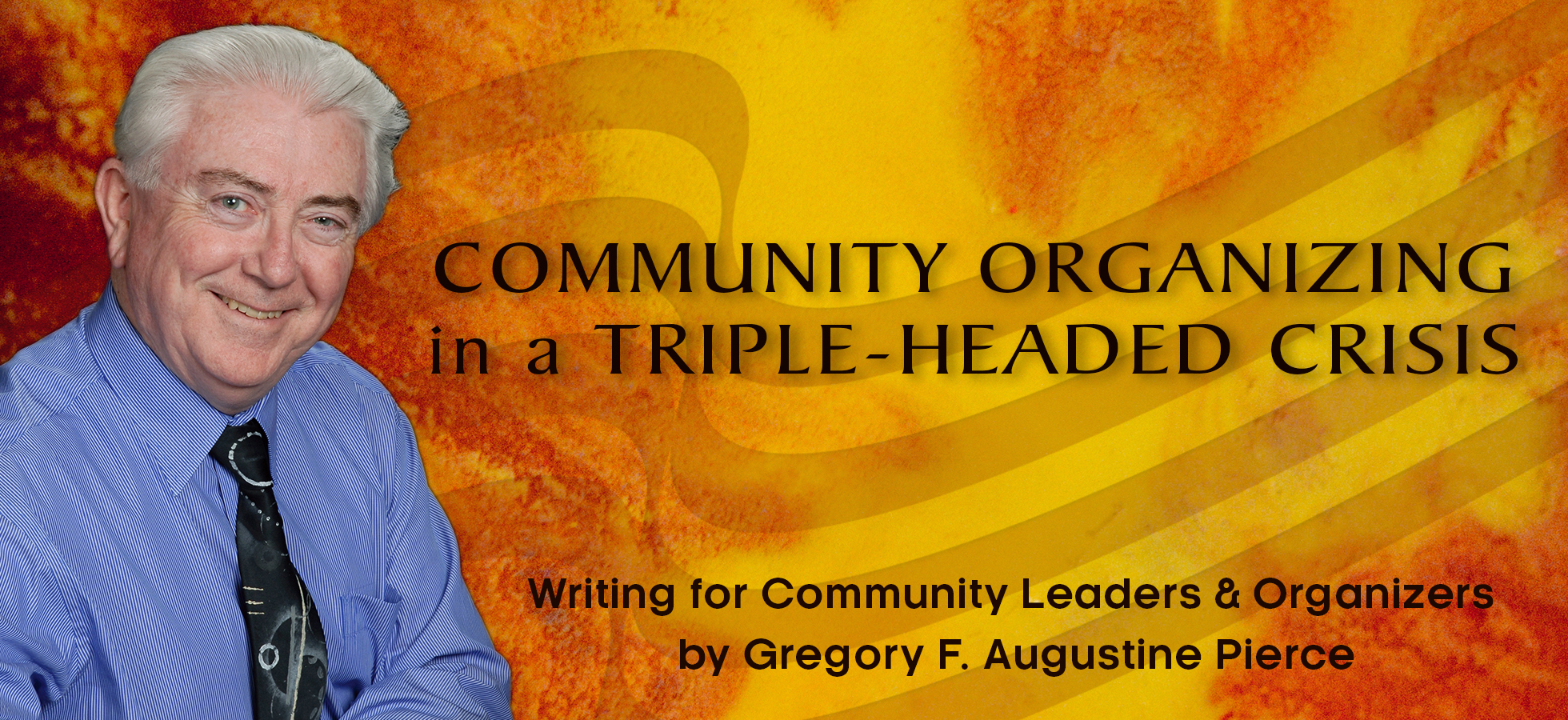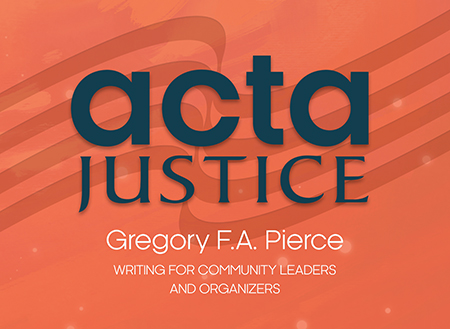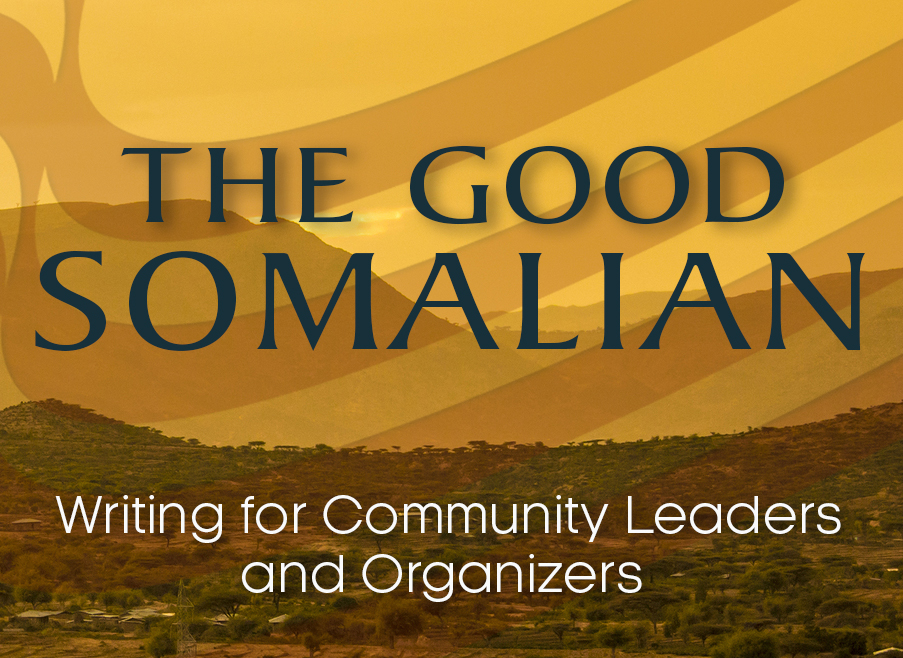ACTA Justice
Recent Posts
Community Organizing in a Triple-Headed Crisis
Posted by on

© 2020 Gregory F. Augustine Pierce
This blog is an
attempt to convince community leaders and organizers that writing can be
another tool in their power toolbox. It offers examples and suggestions on how
to write both artfully and effectively. I have been a publisher for over thirty
years and a community leader and organizer for almost fifty years, so the combination
of these two topics is a natural for me, as in this piece.
When Alexis de Tocqueville observed that “…the health of a democratic society may be measured by the quality of functions performed by private citizens,” he could have been describing the response of community organizers and leaders to the triple-headed (coronavirus pandemic, economic collapse, and racial reckoning) crisis of 2020. (1)
Community organizing is based on building relationships of trust among people who often do not even know one another. But building trust is tough when you cannot have one-to-one, face-to-face relational meetings, are not allowed to run events involving more than 15-25-50 participants, or have no public way to hold politicians and other power brokers accountable.
Here’s the good news: Organizers and community leaders in Illinois and around the country did NOT stop organizing; we adapted. We adapted by using new technology—such as Zoom, Facetime, podcasts, blogs, social media. We adapted by using old technology—such as newspapers, books, magazines, audio books. And we adapted by figuring out how to vote, get out the vote, and continue pressing people in positions of power.
For example, a group of 500 leaders and their supporters, representing 100 people’s institutions in the four-county Chicago-land area, met at Dominican University in River Forest on Sunday afternoon, October 25, with Don Harmon, the new president of the Illinois State Senate on criminal justice reform, including the incarceration of those caught up in non-violent episodes caused by mental illness or substance addiction, and reclaiming communities that have been devastated by decades of neglect or manipulation. Only a dozen of us were live—masked and properly-distanced from the senator and his one aide. The other 490 or so of us were participating in the event via Zoom. Senator Harmon agreed to work seriously with us on all our issues.
Likewise, on Saturday, September 26, in North Lawndale outside the original Sears Tower on Homan Avenue, a group of 50 members of several homeowners’ groups in the area—also distanced and masked and carrying with them the names of 200 other supportive residents who were following the proceedings on Facebook—met with their Chicago alderman, Michael Scott, Jr., and won his support for an ambitious-but-doable drive to build 1000 new affordable homes in their community. At the end of the meeting, Alderman Scott told the group, “Why stop at 1000? Let’s build 3000!”
For me as the owner of a small publishing house in Andersonville, the shutdowns and stay-at-home orders, while challenging financially, also offered the opportunity, time, and motivation to compile, edit, and publish a 400-page collection of some 50 stories, essays, poems, letters, and other writings by community organizers and leaders who reflected on their own experiences of “power and powerlessness.” This allowed me to encourage new people to write and publish for the first time, as well as to find hidden gems from American history that are not well known by the current crop of community organizers and leaders.
During 2020, organizers and leaders have discovered many new ways to work across divisions of geography, race and ethnicity, gender, sexual orientation, economic circumstance, religion, philosophy, and even political ideology. The triple-headed crisis has laid bare the deep and serious inequalities and prejudices in our current democracy so many have taken for granted for so long. And there is a growing recognition that the pressures on individuals (especially young people), families (of all makes and models), and people’s institutions (both religious and secular) can only be relieved, as de Tocqueville insisted, by “the quality of functions performed by private citizens.”
1. Democracy in America, 1835-1840
Gregory F. Augustine Pierce is the CEO and Publisher of ACTA Publications in Chicago. He has worked for over 50 years with affiliates of the Industrial Areas Foundation, formed in Chicago by Saul Alinsky and others in 1940. Pierce is the compiler and editor of Reveille for a New Generation: Organizers and Leaders Reflect on Power, published on November 3, 2020. He can be reached at gfapierce@actapublications.com or at 773-590-3801.
A Call to Reflection
© 2020 Gregory F. Augustine PierceThis blog is an attempt to convince community leaders and organizers that writing can be another tool in their power toolbox. It offers examples and suggestions on how to write both artfully and effectively. I have been a publisher for over thirty years and a community leader and organizer for almost fifty years, so [...]
What Native Americans Can Teach the Nation at This Moment in Our Collective History?
© 2020 Gregory F. Augustine PierceThis blog is an attempt to convince community leaders and organizers that writing can be another tool in their power toolbox. It offers examples and suggestions on how to write both artfully and effectively. I have been a publisher for over thirty years and a community leader and organizer for almost fifty years, so [...]
Comfort in This Time of Crisis
Friends,Here is a poem by John Shea that I have found to be comforting to myself and others in this time of crisis. You have permission to send it to others if you think it might help them as well.Stay as safe and well as possible. Help one another any way you can.Greg PiercePresident and PublisherACTA Publications Spirits Arriveby [...]
Reveille for a New Generation
© 2020 Gregory F. Augustine PierceThis blog is an attempt to convince community leaders and organizers that writing can be another tool in their power toolbox. It offers examples and suggestions on how to write both artfully and effectively. I have been a publisher for over thirty years and a community leader and organizer for almost fifty years, so [...]
A Story for What Ails Us
© 2019 Gregory F. Augustine PierceThis blog is an attempt to convince community leaders and organizers that writing can be another tool in their power toolbox. It offers examples and suggestions on how to write both artfully and effectively. I have been a publisher for over thirty years and a community leader and organizer for almost fifty years, so [...]
Class of '69: Reunion and Renewal
© 2019 Gregory F. Augustine Pierce This blog is an attempt to convince community leaders and organizers that writing can be another tool in their power toolbox. It offers examples and suggestions on how to write both artfully and effectively. I have been a publisher for over thirty years and a community leader and organizer for almost fifty years, so [...]

Three Lessons for Writing on Organizing
© 2019 Gregory F. Augustine PierceThis blog is an attempt to convince community leaders and organizers that writing can be another tool in their power toolbox. It offers examples and suggestions on how to write both artfully and effectively. I have been a publisher for over thirty years and a community leader and organizer for almost fifty years, so [...]

Writing for Community Organizers & Leaders 2
© 2019 Gregory F. Augustine PierceThis blog is an attempt to convince community leaders and organizers that writing can be another tool in their power toolbox. It offers examples and suggestions on how to write both artfully and effectively. I have been a publisher for over thirty years and a community leader and organizer for almost fifty years, so [...]

Writing for Community Organizers & Leaders
© 2019 Gregory F. Augustine PierceThis blog is an attempt to convince community leaders and organizers that writing can be another tool in their power toolbox. It offers examples and suggestions on how to write both artfully and effectively. I have been a publisher for over thirty years and a community leader and organizer for almost fifty years, so [...]
 Loading... Please wait...
Loading... Please wait...
